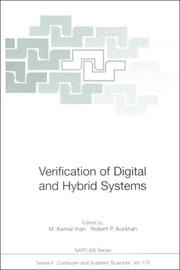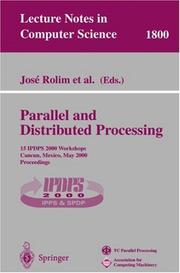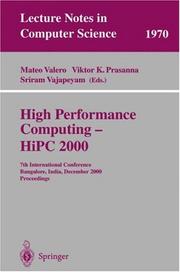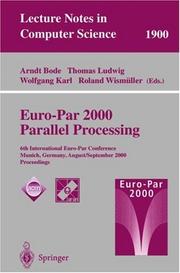| Listing 1 - 4 of 4 |
Sort by
|

ISBN: 3540655956 3642640524 3642596150 Year: 2000 Volume: 170
Abstract | Keywords | Export | Availability | Bookmark
 Loading...
Loading...Choose an application
- Reference Manager
- EndNote
- RefWorks (Direct export to RefWorks)
This book grew out of a NATO Advanced Study Institute summer school that was held in Antalya, TUrkey from 26 May to 6 June 1997. The purpose of the summer school was to expose recent advances in the formal verification of systems composed of both logical and continuous time components. The course was structured in two parts. The first part covered theorem-proving, system automaton models, logics, tools, and complexity of verification. The second part covered modeling and verification of hybrid systems, i. e. , systems composed of a discrete event part and a continuous time part that interact with each other in novel ways. Along with advances in microelectronics, methods to design and build logical systems have grown progressively complex. One way to tackle the problem of ensuring the error-free operation of digital or hybrid systems is through the use of formal techniques. The exercise of comparing the formal specification of a logical system namely, what it is supposed to do to its formal operational description-what it actually does!-in an automated or semi-automated manner is called verification. Verification can be performed in an after-the-fact manner, meaning that after a system is already designed, its specification and operational description are regenerated or modified, if necessary, to match the verification tool at hand and the consistency check is carried out.
Computer systems --- Systèmes informatiques --- Verification. --- Vérification --- Verification --- Systèmes informatiques --- Vérification --- Computer organization. --- Software engineering. --- Computers. --- Artificial intelligence. --- Computational complexity. --- Computer Systems Organization and Communication Networks. --- Software Engineering. --- Computation by Abstract Devices. --- Artificial Intelligence. --- Complexity. --- Complexity, Computational --- Electronic data processing --- Machine theory --- AI (Artificial intelligence) --- Artificial thinking --- Electronic brains --- Intellectronics --- Intelligence, Artificial --- Intelligent machines --- Machine intelligence --- Thinking, Artificial --- Bionics --- Cognitive science --- Digital computer simulation --- Logic machines --- Self-organizing systems --- Simulation methods --- Fifth generation computers --- Neural computers --- Automatic computers --- Automatic data processors --- Computer hardware --- Computing machines (Computers) --- Electronic calculating-machines --- Electronic computers --- Hardware, Computer --- Cybernetics --- Calculators --- Cyberspace --- Computer software engineering --- Engineering --- Organization, Computer --- Electronic digital computers

ISBN: 354067442X 9783540674429 3540455914 Year: 2000 Volume: 1800 Publisher: Berlin, Heidelberg : Springer Berlin Heidelberg : Imprint: Springer,
Abstract | Keywords | Export | Availability | Bookmark
 Loading...
Loading...Choose an application
- Reference Manager
- EndNote
- RefWorks (Direct export to RefWorks)
This volume contains the proceedings from the workshops held in conjunction with the IEEE International Parallel and Distributed Processing Symposium, IPDPS 2000, on 1-5 May 2000 in Cancun, Mexico. The workshopsprovidea forum for bringing together researchers,practiti- ers, and designers from various backgrounds to discuss the state of the art in parallelism.Theyfocusondi erentaspectsofparallelism,fromruntimesystems to formal methods, from optics to irregular problems, from biology to networks of personal computers, from embedded systems to programming environments; the following workshops are represented in this volume: { Workshop on Personal Computer Based Networks of Workstations { Workshop on Advances in Parallel and Distributed Computational Models { Workshop on Par. and Dist. Comp. in Image, Video, and Multimedia { Workshop on High-Level Parallel Prog. Models and Supportive Env. { Workshop on High Performance Data Mining { Workshop on Solving Irregularly Structured Problems in Parallel { Workshop on Java for Parallel and Distributed Computing { WorkshoponBiologicallyInspiredSolutionsto ParallelProcessingProblems { Workshop on Parallel and Distributed Real-Time Systems { Workshop on Embedded HPC Systems and Applications { Recon gurable Architectures Workshop { Workshop on Formal Methods for Parallel Programming { Workshop on Optics and Computer Science { Workshop on Run-Time Systems for Parallel Programming { Workshop on Fault-Tolerant Parallel and Distributed Systems All papers published in the workshops proceedings were selected by the p- gram committee on the basis of referee reports. Each paper was reviewed by independent referees who judged the papers for originality, quality, and cons- tency with the themes of the workshops.
Parallel processing (Electronic computers) --- Electronic data processing --- Computer Science --- Engineering & Applied Sciences --- Distributed processing --- Computer science. --- Computer organization. --- Architecture, Computer. --- Software engineering. --- Computers. --- Computer science --- Computer mathematics. --- Computer Science. --- Computer System Implementation. --- Software Engineering/Programming and Operating Systems. --- Computer Systems Organization and Communication Networks. --- Theory of Computation. --- Mathematics of Computing. --- Computational Mathematics and Numerical Analysis. --- Mathematics. --- Computer mathematics --- Discrete mathematics --- Automatic computers --- Automatic data processors --- Computer hardware --- Computing machines (Computers) --- Electronic brains --- Electronic calculating-machines --- Electronic computers --- Hardware, Computer --- Computer systems --- Cybernetics --- Machine theory --- Calculators --- Cyberspace --- Computer software engineering --- Engineering --- Architecture, Computer --- Organization, Computer --- Electronic digital computers --- Informatics --- Science --- Mathematics --- Computer network architectures. --- Information theory. --- Communication theory --- Communication --- Architectures, Computer network --- Network architectures, Computer --- Computer architecture --- Computer science—Mathematics. --- Parallel processing (Electronic computers) - Congresses --- Electronic data processing - Distributed processing - Congresses

ISBN: 3540414290 354044467X Year: 2000 Publisher: Berlin, Heidelberg : Springer Berlin Heidelberg : Imprint: Springer,
Abstract | Keywords | Export | Availability | Bookmark
 Loading...
Loading...Choose an application
- Reference Manager
- EndNote
- RefWorks (Direct export to RefWorks)
This book constitutes the refereed proceedings of the 7th International Conference on High Performance Computing, HiPC 2000, held in Bangalore, India in December 2000. The 46 revised papers presented together with five invited contributions were carefully reviewed and selected from a total of 127 submissions. The papers are organized in topical sections on system software, algorithms, high-performance middleware, applications, cluster computing, architecture, applied parallel processing, networks, wireless and mobile communication systems, and large scale data mining.
High performance computing --- Computer Science --- Engineering & Applied Sciences --- Computer science. --- Computer organization. --- Microprocessors. --- Software engineering. --- Computers. --- Algorithms. --- Computer science --- Computer Science. --- Processor Architectures. --- Software Engineering/Programming and Operating Systems. --- Computer Systems Organization and Communication Networks. --- Algorithm Analysis and Problem Complexity. --- Computation by Abstract Devices. --- Mathematics of Computing. --- Mathematics. --- Computer mathematics --- Discrete mathematics --- Electronic data processing --- Algorism --- Algebra --- Arithmetic --- Automatic computers --- Automatic data processors --- Computer hardware --- Computing machines (Computers) --- Electronic brains --- Electronic calculating-machines --- Electronic computers --- Hardware, Computer --- Computer systems --- Cybernetics --- Machine theory --- Calculators --- Cyberspace --- Computer software engineering --- Engineering --- Minicomputers --- Organization, Computer --- Electronic digital computers --- Informatics --- Science --- Mathematics --- Foundations --- Computer network architectures. --- Computer software. --- Software, Computer --- Architectures, Computer network --- Network architectures, Computer --- Computer architecture --- Computer science—Mathematics.

ISSN: 03029743 ISBN: 3540679561 9783540679561 354044520X Year: 2000 Volume: 1900 Publisher: Berlin, Heidelberg : Springer Berlin Heidelberg : Imprint: Springer,
Abstract | Keywords | Export | Availability | Bookmark
 Loading...
Loading...Choose an application
- Reference Manager
- EndNote
- RefWorks (Direct export to RefWorks)
Euro-Par – the European Conference on Parallel Computing – is an international conference series dedicated to the promotion and advancement of all aspects of parallel computing. The major themes can be divided into the broad categories of hardware, software, algorithms, and applications for parallel computing. The objective of Euro-Par is to provide a forum within which to promote the development of parallel computing both as an industrial technique and an academic discipline, extending the frontier of both the state of the art and the state of the practice. This is particularly important at a time when parallel computing is undergoing strong and sustained development and experiencing real industrial take up. The main audience for and participants of Euro-Par are seen as researchers in academic departments, government laboratories, and industrial organisations. Euro-Par’s objective is to become the primary choice of such professionals for the presentation of new results in their specific areas. Euro-Par is also interested in applications that demonstrate the effectiveness of the main Euro-Par themes. Euro-Par now has its own Internet domain with a permanent Web site where the history of the conference series is described: http://www. euro-par. org. The Euro-Par conference series is sponsored by the Association of Computer Machinery and the International Federation of Information Processing.
Parallel processing (Electronic computers) --- Computer science. --- Computer organization. --- Software engineering. --- Computers. --- Computer science --- Computer engineering. --- Computer mathematics. --- Computer Science. --- Computer Systems Organization and Communication Networks. --- Computer Engineering. --- Theory of Computation. --- Software Engineering/Programming and Operating Systems. --- Mathematics of Computing. --- Computational Mathematics and Numerical Analysis. --- Mathematics. --- Computer network architectures. --- Information theory. --- Computer mathematics --- Discrete mathematics --- Electronic data processing --- Informatics --- Science --- Computer software engineering --- Engineering --- Communication theory --- Communication --- Cybernetics --- Architectures, Computer network --- Network architectures, Computer --- Computer architecture --- Mathematics --- Computer science—Mathematics. --- Automatic computers --- Automatic data processors --- Computer hardware --- Computing machines (Computers) --- Electronic brains --- Electronic calculating-machines --- Electronic computers --- Hardware, Computer --- Computer systems --- Machine theory --- Calculators --- Cyberspace --- Computers --- Organization, Computer --- Electronic digital computers --- Design and construction --- Parallel processing (Electronic computers) - Congresses
| Listing 1 - 4 of 4 |
Sort by
|

 Search
Search Feedback
Feedback About UniCat
About UniCat  Help
Help News
News